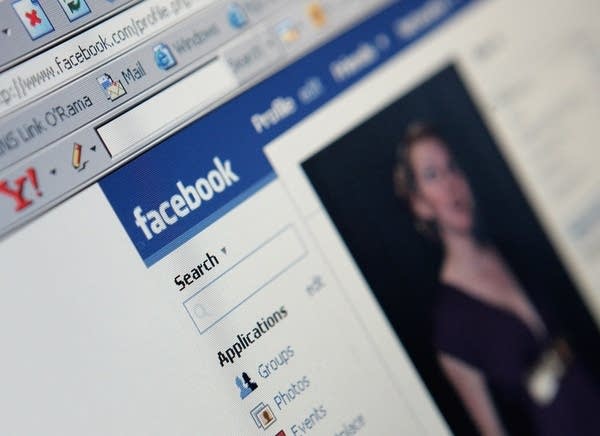For better or worse, Facebook has changed many lives in just 6 years

High school was a decade behind her, and Abbey Bryduck was no longer thinking about her old crush who played the drums in band. That is, until she saw his name pop up on Facebook.
Less than two years later, Abbey and Nick Bryduck live in Minneapolis. They are married and expecting a baby. Abbey had "friended" Nick on Facebook, and the two started chatting online one day when they were both on the site.
Abbey said she never would have seen him again without the social networking site.
"He kind of thinks it was fate. I think it was just that we were on Facebook at the same time," Bryduck said.
Create a More Connected Minnesota
MPR News is your trusted resource for the news you need. With your support, MPR News brings accessible, courageous journalism and authentic conversation to everyone - free of paywalls and barriers. Your gift makes a difference.
Facebook recently celebrated its sixth birthday, and now has more than 400 million active users worldwide. While it hasn't changed most people's lives the way it changed the Bryducks, there are many ways Facebook has altered the way people communicate and with whom they share information.
Like the Bryducks, several people who responded to MPR's Today's Question said Facebook helped them make connections with people from high school or other friends from the past.
Others pointed to specific examples where the site was used to disseminate key information, like when Ruth DeVore and her family found out through Facebook that their relatives in Chile were safe after the devastating earthquake last week.
Damon Moss, who recently moved to Minneapolis and doesn't have many friends here yet, said it's been nice to be able to connect with friends online while he gets settled. But he said some of those connections can feel pretty weird.

Take last week, when Moss celebrated his birthday.
"I probably got 35 or 45 birthday wishes on Facebook," Moss said. "I'm looking at some of these people and thinking, 'I haven't seen you since I was 15 years old. ... You probably didn't know when my birthday was 15 or 20 years ago.'"
"It's kind of surreal to me," he said.
The other effect Facebook has for many people, including Moss, is realizing they don't have control over information that's published about themselves.
While out for dinner with friends one night, Moss' cell phone started buzzing like crazy. When he checked it, he realized a friend from high school was posting old photos of him.
"For every picture, I'm getting an e-mail," Moss said. "I felt like this whole thing is happening and I have no control over it!"
Sociologists and social media experts will probably continue debating for years about the effect Facebook has had on people's lives.
During a discussion Wednesday on MPR's Midmorning, media consultant Aram Sinnreich described Facebook as an "operating system for society."
"It allows people to do what they already had been doing with one another, but to do so on a broader scale," said Sinnreich, managing partner at Radar Research, a media and technology consulting firm.
One problem that arises frequently is that people end up with a wide range of types of Facebook friends -- acquaintances from both past and present, family members and co-workers -- and must decide what information to share.
Sinnreich, who gave an example of being friended by a student who at one point sent a status update about a night of heavy drinking, said people should think about looking the other way when they come across information they know isn't intended for their eyes.
"Because we have this multi-dimensional identity that is being crystallized within a single site that is Facebook, we have to learn how to view one side of someone's identity and ignore the other side," he said.
Hiawatha Bray, a technology reporter for the Boston Globe who also spoke on Midmorning, disagreed.
"I think they have to learn which bit of the world they want to share stuff with," he said. "The burden is on the people communicating."
Facebook has caught onto the issue and now lets users limit who is allowed to see certain information.
But Abbey Bryduck is thankful her husband chose to share certain information with his Facebook friends before they started dating.
"You can snoop on it. So I saw he was kind of seeing somebody, and then he wasn't, and you can kind of strike when the time is right," she said.
